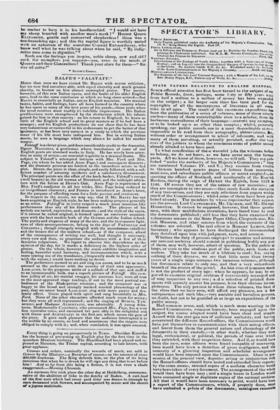BALFE'S " FALSTAFF."
MORE than once we have visited Mr. BALFE with severe criticism, but we now find ourselves able, with equal sincerity and much greater alacrity, to bestow on him almost utimingled praise. The merits, however, of this new Italian opera, and the faults of his older English ones, lead to the same conclusion at which we long since arrived—that BALFE is essentially an Italian, not an Enelish musician. His musical tastes, habits, and feelings, have all been formed in the country where be has spent so many of the best years of his youth—those years when the mind receives most readily its indelible impressions. His Italian predilections were streegthentd by the distinction which his talents gained for him in that country : on his return to England, he knew as little of the English school and its great masters as if lie had been a stranger ; and his English productions do not show that he has been very industrious or successful in his endeavours to get the better of that ignorance, or has been very earnest in a study to which the previous tenor ef his life must have indisposed him. But in writing Italian music, he uses a language which may almost be called his mother tongue.
Falstaff is a clever piece, and does considerable credit to the dramatist, Signor Mecciosa, a gentleman whose translations of some of our English poets are standard works in Italy. He has wisely been atten- tive to unity of action—an essential requisite in a musical drama. His subject is Falstuff's attempted intrigue with Mrs. Ford and Mrs. Page, (to whom lie has added Anne Page.) and consequent disasters ; and the dramatis personae are limited to the immediate actors in that plot. Hence, the piece is clear, simple, and easily followed, with a suf- ficient number of amusing incidents and a sensfactory denouement. The principal points are the affair of the buck-basket, Falsteff's escape (well beaten) as the old woman of Brentford, and the midnight adven- ture with the fairies at Ilertie's Oak. Anne Page is represented as Mrs. Ford's coadjutor in all her tricks, Mrs. Page being reduced to a.n insignificant character; and Fenton is introduced as Anne's lover, for the purpose of affording room for a little passion and sentiment. In respect to the music, we may say, that if Mr. BALTE has not been acquiring an English style, be has been making progress generally as an artist. Falstaff is in every respect a much more musician-like performance than any of his former works. The phrases of his melody are varied, expressive, and dramatic ; and the style of the opera, if it cannot be culled original, is formed upon an •extensive acquaint- ance with the best models both of the German and the Italian school. The purity and elegance of many of the airs, and the transparent light- 'less of their accompaniments, belong to the days of PAESIELLO and C1MAR0SA ; though strangely mingled with the monotonous eaballetti and the brazen din of the modern school—as if the composer, afraid
of the consequences of writing too well, had thought it necessary, every now and then, to propitiate the audience with a few of their favourite vulgarisms. We regret to observe this dependence on the °Onion of the day, for it marks a deficiency in the highest order of genius. On the whole, however, the music exhibits imagination and feeling, beautiful vocal harmony, and instrumentation which, with a more sparing use of the trombones, (frequently made to bray in unison with the voices,) would leave nothing to desire.
The performers seemed to act and sing con amore, and to be as much amused as the audience with the novelty of their own appearance. LABLACHE, in the gorgeous attire of a solder& of that age, and stuffed to an immeasurable bulk, was a superb picture of Falstaff. His cat e- less jollity of air, his martial swagger, his amorous leer, were all true to the most approved stage readings, if not to the most poetical em- bodiment of the Shaksperian creation ; and the composer was
happy in the broad and strongly marked musical phraseology of the part, that we never heard LABLACHE sing with more power and dra-
matic effect. Gant played with spirit and sang beautifully in Mrs. Ford. None of the other characters afforded much room for acting; but they were all well represented; and the singing of RIMINI, TAN. BURIN!, and Madame Aumwrezzi, was admirable. A young debit- tante, Mademoiselle CAREItIOLI, who personated Mrs. Page, has a very fine contralto voice, and sustained her part ably in the delightful trio with Geist and ALBERTAZZI in the first act, which seems the gem of the piece. It gave such pleasure that the audience interrupted it in the middle by an encore, so loud and unanimous that the singers were obliged to comply with it ; and, when concluded, it was again encored.


























 Previous page
Previous page